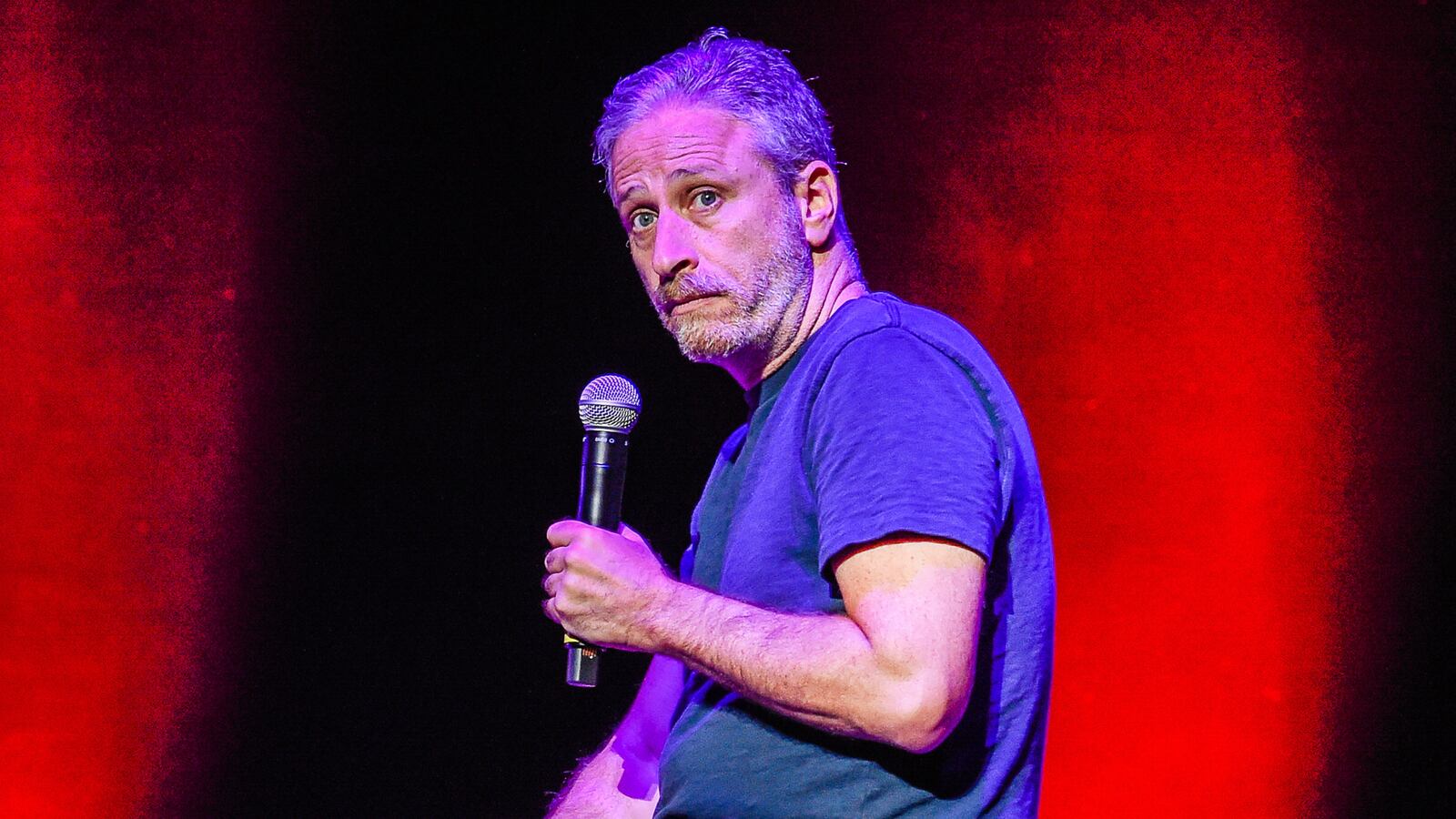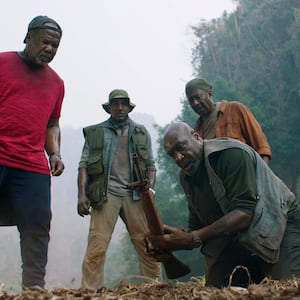Jon Stewart is back from the ether with a film about party politics and a long interview in The New York Times Magazine with David Marchese that begins with a discussion on—*checks notes*—police brutality. Personally, I’ve never asked myself, “What are Jon Stewart’s thoughts on policing and white supremacy?” And since Stewart decided to sit out the last four years of special hell while he crafted his satire for Hollywood, it’s especially odd that he’s showing up now, in the midst of revolutionary levels of upheaval by Black activists and their supporters, to give his two cents.
However, a cursory trending Twitter check shows that quite a few white people who have idolized the former Daily Show host for decades are giddy about their favorite “nuanced” white American man coming forward to set the record straight on what kind of change needs to happen in the U.S.
I read the interview expecting Stewart to make some kind of wistful statement about America’s founding documents (many of the authors of those documents enslaved Black people), and of course, that moment came alongside a bizarrely misinformed statement about the relationship of policing to racism. Claiming that policing is the “least” of the problems faced with regard to racism in this country, Stewart says, “Police brutality is an organic offshoot of the dehumanization of those power structures. There are always going to be consequences of authority[...] It can be true that you can value and admire the contribution and sacrifice it takes to be a law enforcement officer or an emergency medical worker in this country and yet still feel that there should be standards and accountability. Both can be true. But I still believe that the root of this problem is the society that we’ve created that contains the schism, and we don’t deal with it, because we’ve outsourced our accountability to the police.”
Where does one begin?
Firstly, police brutality is not “an organic offshoot.” Police were created specifically as a tool of racist oppression, and have been used exactly for that purpose through the entirety of U.S. history. Police brutality didn’t just materialize out of Jim Crow conditions, the police enforced Jim Crow like they enforced slavery and American Indian genocide. Like many have said, the brutality—in its various forms—is the point. Just like you cannot divorce racism from capitalism, you cannot divorce racism from policing. To say it is merely a symptom is to miss entirely what the word racism means and how its realities manifest.
Secondly, to equate, as Stewart does, police officers with emergency medical workers is an insidious normalization of the work of policing. Yes, emergency medical services can be racist institutions (just like the overall allopathic medical system), and in fact, in Minneapolis, where George Floyd was murdered, the police have requested that EMS workers inject ketamine, a date-rape drug, into people they detain, which has resulted in the injected individuals having to be medically revived and intubated. But the function of Stewart casually equating these institutions ultimately serves to absolve the police and make their work seem necessary. “Contribution and sacrifice” is part of the myth-making around police work that tells us that there are just some bad apples in the bunch, and really what we need is to put better rules in place for bad cops to—*checks notes again*—follow.
Stewart goes on to say that “we’ve outsourced our accountability to the police.” By “we,” let’s generously assume he means the system of white supremacy that white people have created, upheld, and continuously benefit from. But to outsource accountability, there has to be accountability present somewhere in the line of command. And there is no accountability in policing by design—what white people have done is outsourced their dirty work. Call the cops on the Black person walking down your sidewalk and you don’t have to be the one to shoot him (of course, we know that Ahmaud Arbery’s murderers, Travis and Gregory McMichael, who worked with law enforcement, felt comfortable taking up the task themselves).
And when Black people, particularly Black women, go to police with their own reports of abuse, they’re ignored; recently, Oluwatoyin Salau, a 19-year-old Black Lives Matter activist, was murdered in Tallahassee after reporting her sexual assault to police. Black trans women like Nina Pop and Rem’mie Fells have been murdered with impunity in alarming numbers for years; often police departments and media deadname and shame them in the aftermath.
It’s clear that Stewart, a trusted white narrator, hasn’t done his research, and that’s why it’s easy for him to wax poetic about vague societal change without examining policing for what it is and what it does. Advocates of transformative justice, which is part of the prison and police abolition frameworks, have spoken, studied, and written for years about what it means to create a world with true accountability. In the process, they have crafted a template for much of the work that needs to be done to have accountable institutions of any kind in our society. Many racists disturbed by protests against police brutality bring up “black-on-black crime” to say that the real problem is Black people, not police (this claim conveniently misses the much higher prevalence of white-on-white crime—DOJ statistics show that 84 percent of white people killed every year are murdered by other white people). In fact, abolition seeks to address harm that comes from every direction and within all communities without further perpetuating harm by calling armed officers on people and locking them up.
What Stewart’s NYT Magazine interview does is reaffirm the authority of a politically oriented entertainer who has coasted on a severely limited understanding of racial politics for years. Stewart’s Daily Show replacement Trevor Noah, a mixed South African who is understood as Black in the U.S., has spoken much more intelligently about police brutality. And Stewart’s former Daily Show employee Larry Wilmore has conducted multiple thoughtful interviews with researchers and journalists about racial politics on his podcast Black On the Air (Wilmore used to host his own late-night comedic political commentary show, The Nightly Show, which was canceled in 2016). And yet the Times, in the midst of Stewart’s awkwardly timed movie publicity tour, felt it was a good moment to re-center the half-baked ideas of the comedian and filmmaker.
In the part of the interview about racism and police brutality, Marchese’s questions are mostly deferential, as if he’s asking an expert for clarity on a subject he knows very little about. And while the latter may very well be true, this approach perpetuates media incompetence in addressing and informing about racism. Later on, Marchese is much more insistent in pressing Stewart about his questionable Rally to Restore Sanity and/or Fear held in 2010, which many have pointed out downplayed the overall extremism of the modern-day Republican Party. But Stewart holds his ground, refusing to concede that his conceptions of “nuance” are actually just white Western norms about civility that suit comfortable people; from there, Marchese moves on to the softball questions.
Calls to restore nuance, like freedom of speech, are often a respectable white society dog whistle for “some of these Negroes are getting too feisty” (and respectability politics-loving Black and non-Black POC have been known to adopt this perspective as well). This is to say that the word doesn’t mean what it really means when spoken by people trying to protect their positions of power while asserting themselves as authorities on systemic oppression. Trump, with his flagrant bigotry and uncouthness, has offered this group a new platform to seem relevant as they trot out tired ideas that challenge absolutely nothing. It’s time to stop falling for it.


